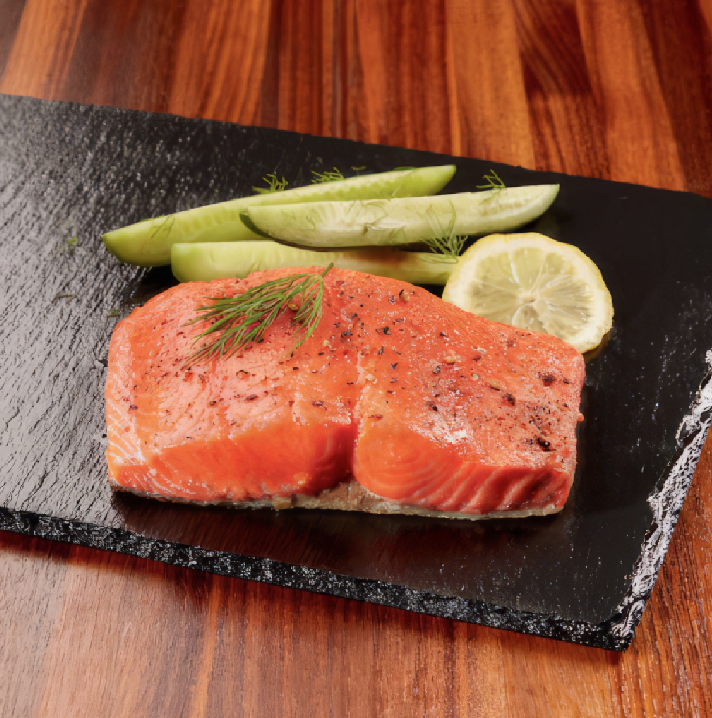Atlantic Farmed Salmon, and Why to Pick Wild-Caught Instead
Atlantic farmed salmon is a type of salmon bred and raised in fish farms as opposed to being caught in the wild. Farmed salmon are available year-round, and at a bit lower price than wild-caught salmon. My local Costco carries 3 lb of frozen filets of Farmed Salmon for $39 ($13/lb), vs. $45 ($15/lb) for Wild Salmon.[1, 2] However, farmed salmon are mass-produced in comparatively cramped conditions, and their feed is designed to maximize profit margins; not nutritional profile - to the point that a 2017 documentary labeled farmed salmon as the “world’s most toxic food”.[3] Here are several reasons why you should avoid farmed salmon, and pick wild salmon instead:
- Health concerns: Farmed salmon can contain higher levels of contaminants such as PCBs, dioxins, dieldrin, aldrin, and toxaphene which are linked to cancer and other health issues.[3,4] These contaminants come from dry meal pellets fed to the farmed salmon to prevent the fat from going rancid.[3] Unfortunately, because of salmon’s natural fat content from omega-3 fatty acids, the flesh absorbs higher levels of chemical residues and pollutants tethered to the fat and found to be five times more toxic than other natural fish products.[3] In a study by researcher, Jérôme Ruzzin, the concentration of toxic chemicals in various food products was measured, and farmed salmon showed higher levels of pollutants than other products.[3] Ruzzin and other researchers studied and tested diets with and without farmed salmon and concluded that consuming the fat from farmed salmon increased the risk of obesity and diabetes.[3,5]
- Nutritional concerns: Although fish is recommended by doctors and nutritionists for its rich nutrient and protein content, the flesh of farmed salmon differs nutritionally from that of wild salmon. A 2017 documentary found that wild salmon typically contains 5 to 7% fat, while farmed salmon with toxins contains 14 to 34% fat.[3] The high percentage of fat comes from the contaminants, as a result, farmed salmon may have lower levels of beneficial nutrients such as omega-3 fatty acids than wild-caught salmon, due to differences in diet and living conditions.
- Environmental & Ethical concerns: Salmon farms can negatively impact the environment, including pollution from fish waste and chemicals used to treat diseases and parasites.[4] Rapid reproduction in crowded conditions results in a habitat rife with parasites and diseases making the salmon sick.[4] To counteract those parasites and diseases, workers spread pesticides, antibiotics, and other drugs; wearing suits and gas masks to protect themselves from chemicals when spreading pesticides into the water.[3] Despite these added chemicals, and pesticides known to have neurotoxic effects, fish farms regardless can lead to the spread of diseases and parasites to wild fish populations.[3,4] Especially with open-net pen farms, diseased farmed salmon can enter the ocean endangering the ecosystem if they do not practice farmed salmon containment.[6] For instance, in British Columbia’s Clayoquot Sound, the sea lice count of two open-net-pen fish farms were “five times the legal limit” at the time when wild salmon were migrating through, which led to the suspension of 19 fish farms from the Discovery Islands area in 2020.[6]
Overall, while Atlantic-farmed salmon may be more widely available and less expensive than wild-caught salmon, there are several strong reasons why it’s better to only eat wild salmon.
Identifying Farmed vs. Wild
Avoiding farmed salmon is easier said than done, because the slightly lower price point and broader availability has led many restaurants to serve farmed salmon. Studying the menu and asking your server can help. Fortunately, the differences between wild salmon and farmed salmon are visually striking. Farmed salmon is a far lighter shade of pink compared to the majority of wild salmon species (which are a deeper red color), and has thicker intra-muscular fat deposits (more fat between the “flakes”). Though wild salmon’s color tends to fade a bit in cooking, overall the difference is clear to the trained eye whether raw or cooked. Here are examples, courtesy of Costco’s website:



Alternative: Mitigating Exposure
If avoiding farmed salmon is not possible in your situation, an alternative to reduce exposure to pollutants is to reduce consumption of the fat by trimming off the fattiest sections (especially the skin and the gray-brown layer of insulating fat between the skin and muscle) of the fish, and cooking the fish on a rack to allow the fat drips to fall off the fish.[4]
References
- Kirkland Signature Atlantic Salmon (Retrieved 2023, April 17). From: https://www.costco.com/kirkland-signature-atlantic-salmon%2c-3-lbs.product.100416713.html
- Kirkland Signature Wild Alaskan Sockeye Salmon (Retrieved 2023, April 17). From: https://www.costco.com/kirkland-signature-wild-alaskan-sockeye-salmon%2c-5-oz---7-oz-portion%2c-3-lbs.product.100441201.html
- Guiliano, M. YouTube. (2017, March 25). Farmed Norwegian salmon world's most toxic food. YouTube. (Retrieved 2023, April 16). From https://www.youtube.com/watch?v=RYYf8cLUV5E&ab_channel=MarcusGuiliano
- Farmed Salmon vs. Wild Salmon. Washington State Department of Health. (n.d.). (Retrieved 2023, April 16). From https://doh.wa.gov/community-and-environment/food/fish/farmed-salmon
- Ibrahim, M. M., Fjære, E., Lock, E. J., Naville, D., Amlund, H., Meugnier, E., Le Magueresse Battistoni, B., Frøyland, L., Madsen, L., Jessen, N., Lund, S., Vidal, H., & Ruzzin, J. (2011). Chronic consumption of farmed salmon containing persistent organic pollutants causes insulin resistance and obesity in mice. PloS one, 6(9), e25170. https://doi.org/10.1371/journal.pone.0025170
- Owens, B. (2022, July 4). Wa, BC leaders weigh closing controversial Salmon Farms. Crosscut. Retrieved April 18, 2023, from https://crosscut.com/environment/2022/07/wa-bc-leaders-weigh-closing-controversial-salmon-farms
